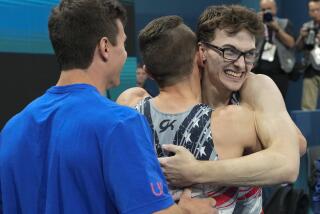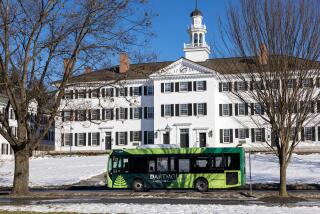VIEWPOINT / HENRY CHU : Ex-Academic Decathlete Says Quiz Has Gotten Serious; No Kidding!
- Share via
They trooped in purposefully, marching as to war. The Killer Brains.
Soon, hundreds of high school students packed the Boise, Ida., gymnasium that Saturday afternoon two weeks ago, ready to join a grueling battle of wits, to bring the national academic decathlon to a head with the pressure-packed Super Quiz before a crowd of rowdy parents, tight-lipped coaches and us observant journalists.
Nerves twanged. Hands trembled. Palms sweated. Chills spidered down the spine.
And that was just me.
A sudden bout of deja vu had induced such a fit of anxiety that I was forced to get a grip on myself, to reclaim the role of an uninvolved reporter, pen poised over paper, eyes trained on the students.
What came flooding back were memories of not so long ago, when I was the one on display, an adolescent academic decathlete up against my peers before an audience like this one, hoping that I wouldn’t disgrace myself by chalking up just one right answer out of five, or, worse, a big goose egg. By the time I graduated from high school in 1986, I had let myself be shanghaied onto our team three times, mostly because I was unwilling to risk the hostility of teachers who brandished their blood-red pens menacingly over my report card whenever I hinted at refusal.
Now, six years later, as The Times reporter who covered the state champions from El Camino Real High School of Woodland Hills when they went after the national crown, I can wheel out a solemn pronouncement my parents like to use:
Things have changed since I was a kid.
Oh, the mechanics and structure of the competition remain essentially the same, which helped me write the story with an insider’s insights. Students still take tests in six subjects from physics to fine arts, write timed essays, deliver prepared and impromptu speeches, and submit to a personal interview.
But much as I may have sympathized with the El Camino team members, much as I wished I could nudge them in the ribs and whisper conspiratorially, “I know how you feel,” the truth was, I didn’t really.
When I participated in the decathlon in Orange County, which is where the event originated more than a decade ago, many of the teams were like ours from El Modena High: slapdash squads cobbled together perhaps a month before the competition, more to be a presence at the contest than a real contender. We flew by the seat of our pants, which explains why our team never got past the first round, finishing only once in the county’s top 11 (read: we were No. 11).
Our “preparation” didn’t deserve the word. We met a few days a week after school for two hours a shot, listening to quick-hit lectures on economics, art history and math. We used the ever-popular and ubiquitous Cliffs Notes to take a shortcut through novels we were supposed to read. We passed notes, drank soda, belched, talked out of turn, flirted.
Nowadays, it’s serious business. Schools with top teams assemble their squads in separate classes beginning in the spring semester, in anticipation of the first wave of combat in the fall. Students and coaches meet through the summer and even on weekends.
True, by my final year of competition, this kind of intensive preparation was becoming more common. But it was still more extraordinary than ordinary.
“Did you hear that Foothill High actually has a class devoted to this?” we would hiss among ourselves and at other decathletes on the day of the event. “No way!”
Way --as they say on Wayne’s World.
The academic decathlon, now a fixture in nearly every state in the Union, has gone the same route of just about everything from children’s soccer to Little League to the cachet kindergartens parents try to secure for their unborn children. The competition is white-knuckled, the pressure crushing. The goal is to win.
Looking out at the sea of students that Saturday, I didn’t envy them. And I related less to the teen-agers from El Camino, and their strong rivals from Arizona, Texas and Illinois, than I did to the competitors from one Southern state, whom I heard consoling each other with a peppy “Hey, at least you got one.”
Not that competition is necessarily evil. And there is much that can be--and often is--said on behalf of striving to perform well and watching hard work pay off. My fellow team members and I were admittedly a little cavalier sometimes in our attitude, perhaps because we were coerced to take part.
And as one of the C-average students on the El Camino team told me, the decathlon has taught him discipline and how to study effectively. He and his teammates also evinced a refreshing camaraderie and acted like normal, healthy teen-agers, the boys wrestling each other in the hotel hallways to relieve tension and scarfing down candy as they studied beneath posters of scantily clad women.
But so much weight rested on their shoulders. I was a little sad for days gone by, and sadder still when I saw one young man in Boise turn around with an expression of despair every time he missed a Super Quiz question. I remembered one year when the questions were so unexpectedly difficult and seemingly impossible that my teammates and I burst into laughter as our performance grew increasingly dismal.
Competition has its place and can be serious indeed. But my parents also used to say that you should take nothing more seriously than life, and even that with a smile.
And now, at all of 23, I’ll say it too.
More to Read
Sign up for Essential California
The most important California stories and recommendations in your inbox every morning.
You may occasionally receive promotional content from the Los Angeles Times.














